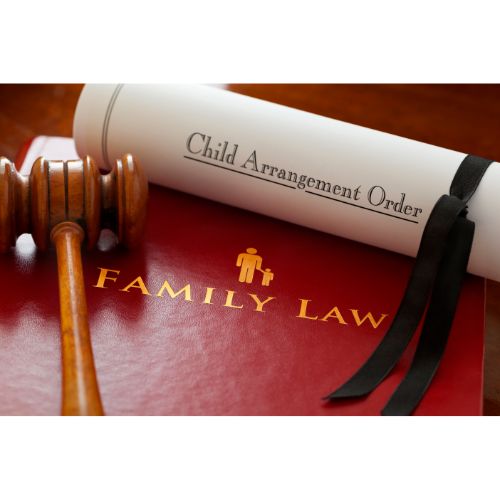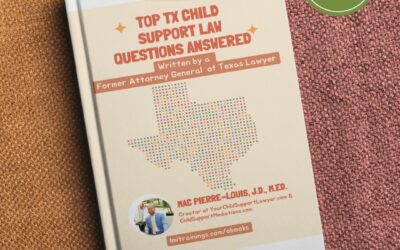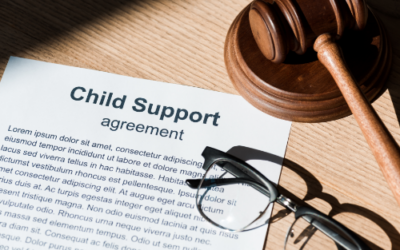Top 5 Reasons Family Law Orders Involving Children Are Modified in Texas

The following Top 5 reasons are rated in terms of weight and (in my opinion) importance not frequency:
5: Increase child support
It’s usually the case that an obligor will make more money over his working life. So it should be no surprise many custodial parents expect and like the law allowing for increases in child support. Under Texas law, child support can be increased when either:
- (1) the “circumstances of the child or a person affected by the order have ‘materially and substantially changed'” since the original order was signed by the judge. Or
- (2) three years have passed since the original order was signed by the judge AND the new child support amount differs from the original child support by either 20% or $100.00.
The easy way to get the increase is to wait 3 years and hope the new child support amount is at least 20% or $100 more than the original child support amount previously ordered. If 3 years has not passed and/or the 20%/$100 rule has not been met, there needs to be a material and substantial change in circumstances to justify the increase.
4: Decrease child support
Another major reason to modify a family law order is to decrease child support. Lawsuits to decrease support are filed mainly by noncustodial parents seeking lower payments due to life changes like job losses or reductions in pay. The law permitting child support decreases is the same law for increasing child support: there must be either a material and substantial change in circumstances or 3 years must have passed with the obligation amounts differing by either 20% or $100. A lawsuit to decrease support may be met with a fight by the other party, especially if it’s believed the one decreasing child support is doing it with ulterior motives.
3: Change possession (visitation) for more access
Oftentimes, parents (mainly noncustodials) seek to modify an order to see their child more often. There are many reason for this. Perhaps the custodial parent is restricting access to the child. Perhaps the original visitation terms of an order are no longer useful or do not work with one party’s new job schedule. Many times parents get new job schedules that conflict with the typical standard possession order placed in their decree, limiting their quality time with their child. Other times parents move further from each other causing unforeseen complications that affect one parent’s ability to spend time with their child. Sometimes one parent is forced to first abide by a modified step-up (phase-in) possession schedule to help acclimate them to their child. When a parent under a modified possession schedule seeks a more standard possession order, they need to file a lawsuit to change the structure of their possession.
2: Change possession (visitation) for less access
Another reason to modify a family law court order is to decrease or remove one parent’s possession or access to a child. Children need to be protected and they cannot file lawsuits to protect themselves. A parent, or sometimes a state entity such as CPS, has authority (and a duty) to request to modify a parent’s access to a child when there is actual or potential harm to the child. Restricting or terminating possession to a child for nefarious reasons is not fun; it involves a lawsuit, may require a court-appointed amicus, or even possibly attorney and guardian ad litems to help protect the interests of the child and parents involved. Unfortunately (or fortunately) family courts are filled with suits seeking to reduce one party’s access to their child because that party acts in ways that significantly impair the child’s physical health or emotional development.
1: Change custody (primary conservatorship)
A “custody fight” is the most contentious and expensive type of lawsuit impacting children, and therefore the top reason family law orders involving children are modified in Texas. Found under Section 156.101 of the Texas Family Code, a suit to modify and change the parent who will be the “primary conservator” with the right to determine the child’s residence is a major battle because the right to determine where a child lives comes with many other rights. The parent who decides where a child lives typically also gets the right to receive child support, determine the child’s school and education plan, claim the child for tax purposes, and decide the child’s day-to-day life. The primary conservator wields a lot of influence over a child for life, impacting the child’s health and emotional well being for decades. When parents cannot agree on who will be a child’s primary conservator and determine the child’s residence, a family court judge is tasked with choosing the parent who will act more in the child’s best interest (or in some instances, choosing the least bad parent). Once a court order establishes a primary conservator, either by agreement or judicial decree, it is a major event to upset the norm and change what a child is used too. To change primary conservatorship there must be a showing that a swap would be in the best interest of the child and that circumstances involving the child or parent have “materially and substantially” changed since the last order was signed. In a contest, whether circumstances are “material and substantial” enough to justify a change in conservatorship will depend on the court.
Another reason a modification of custody is a major event is because kids get their say. In Texas, children 12 years old and above can tell the court their preference on which parent they want to live with. Because teenagers are unpredictable, a custodial parent may be surprised to learn her child desires to go live with the other parent.
A final reason why modifying which parent has primary conservatorship is important is how it happens. Per Texas Family Code 156.101(3), the primary conservator can lose her right to determine her child’s residence if she voluntarily relinquishes primary care of the child for at least six months to another party. It’s frequently the case where a noncustodial parent who has a child live with him for six months can go to court and successfully acquire custodial rights over the child.
There you have it, the top 5 reasons family law orders involving kids are modified in Texas.
https://yourchildsupportlawyer.com/child-custody/age-a-child-can-decide-which-parent-to-live-with/





